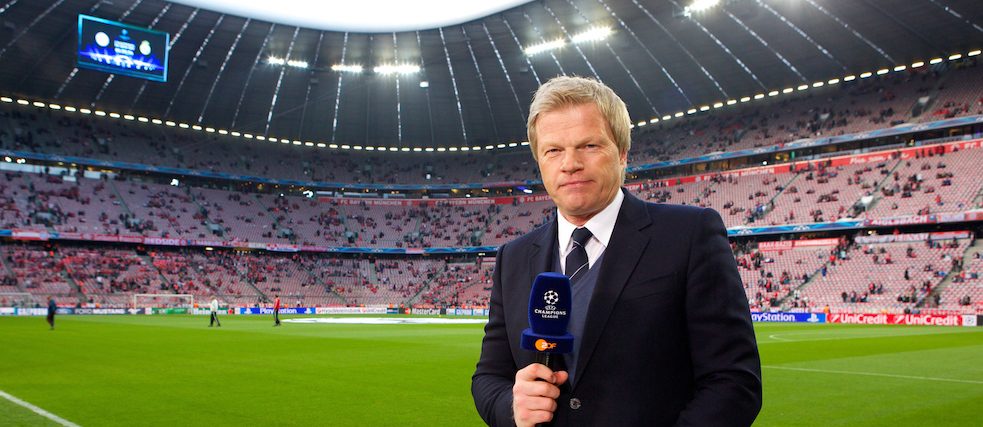Whether they end up as TV pundits, officials or managers, many former football stars in Germany remain loyal to their sport. Some follow rather unusual paths, however.
By Mara Pfeiffer
For many people, the career they pick is the one they remain in throughout their working lives. The situation is different for professional athletes such as footballers: no matter how passionate they are about their sport, sooner or later their bodies can simply no longer compete on a professional level. So what are they to do as their active careers draw to a close?
TV pundits, managers, officials
When a new face appears on German TV alongside the familiar sports presenters, the pundit in question is often a former football star. For many years, this role on the ZDF channel has been assumed by three-time World Cup goalie Oliver Kahn, while ARD currently has former Germany player Thomas Hitzlsperger under contract.
It is also not uncommon for players to switch to the role of football official or manager when choosing a “career after their career”. Franz Beckenbauer is probably the most prominent example in Germany: when his career as a player ended, he became manager of the German national squad from 1984, taking the team to World Cup victory in 1990 – a title he had also won as a player in 1974. Beckenbauer was also considered one of Germany’s leading football officials, or at least he was until the latest allegations of corruption were raised. As vice-president of the German Football Association (DFB) and chairman of the Organizing Committee for the 2006 World Cup, he played a key role in the decision to allow Germany to host the 2006 World Cup, and in its organization.
Continuing an active career abroad
In the later stages of their lives as professional athletes, many stars opt for a transitional phase during which they allow their careers to peter out gradually abroad. In 2014, former Germany player Manuel Friedrich left the Bundesliga and signed with Mumbai City FC. The idea was for celebrities such as Friedrich, the Italian World Cup champion Alessandro Del Piero and Fredrik Ljungberg from Sweden to give football a much-needed boost in this cricketing nation. “The Indian passion for cricket means that football has a difficult time of it there”, says Friedrich, looking back. “Though we were certainly able to get those who did come to the stadium fired up.” The opening match attracted a crowd of 70,000. “The mood was really great. The problem is that matches are played in these oval cricket stadiums where the fans are a lot further from the pitch than in a football stadium. Players are not used to that”, Friedrich recalls. In the meantime he has retired from football and has been training as a golf coach since 2017.
A new start in business
Among the generation of players who are currently around 30 years old, a career in business appears increasingly popular. Simon Rolfes, who played for Bayer Leverkusen and for Germany, is one successful example: at the age of 32 he retired from active football in 2014 and set up a consulting agency for young professional athletes together with financial expert Markus Elsässer. In addition, they jointly took over a company specializing in goal-line technology. Former Germany goalie René Adler, who scored top marks in the degree in sport management he completed in 2016, is already planning his next step: he has joined T1tan, a start-up that makes goalkeeping gloves, and runs an academy for talented young goalkeepers in Hamburg.
Winemaker, nightclub owner or professional wrestler
Some ex-pros follow completely different paths, however: Nico Patschinski (FC St. Pauli) used to work as a funeral director and is now a bus driver in Hamburg. Johan Micoud (Werder Bremen) made wine until he began missing football too much. Today he is president of the French club AS Cannes. Jay-Jay Okocha from Nigeria (Eintracht Frankfurt) opened a nightclub in Lagos, while Holger Stanislawski (FC St. Pauli) is not only a TV pundit for ZDF but also co-owner of a food market. The attempts at a second career of Tim Wiese, a goalie who played for Werder Bremen, TSG Hoffenheim and Germany’s national team, attracted somewhat more public attention. Perfectly toned and with bulging muscles, he first appeared in various celebrity TV shows and then bought himself a Lamborghini and trained as a wrestler – though he has since abandoned this career path again.
Preparing for plan B
A project initiated by sports journalist Thorsten Schaar reveals that professional footballers by no means always lead such flashy lives as Tim Wiese. Using the Twitter account
@Exprofis to ask
Where are they now?, he has been gathering information about the second careers pursued by former players – which often do not sound particularly glamorous: manager of an insurance agency, owner of a sports shop, horse riding coach. He once said in an interview that it was not his intention to take away the magic from former stars but to show that many are not set for life when their sporting careers are over, but actually take up an ordinary job. To make sure that they are able to do so, the youth training centres of clubs have for some time been placing greater emphasis on formal school education. The players’ union Vereinigung der Vertragsfußballer (VdV) also works with players so that they understand what options they have once their careers finish. In an interview with the online sports magazine Spox, the union’s director Ulf Baranowsky advises current and prospective pros to follow three golden rules: insure against risks, such as incapacity; set aside a financial cushion, and begin thinking about what happens next before their career ends. As he explains: “Beginning a new life unprepared and with no plan B can entail considerable risks in our experience.”

 Bringing a career to a gradual end abroad | Photo (detail): © Vitaly Krivosheev - fotolia.com
Bringing a career to a gradual end abroad | Photo (detail): © Vitaly Krivosheev - fotolia.com